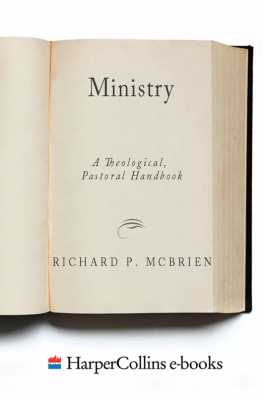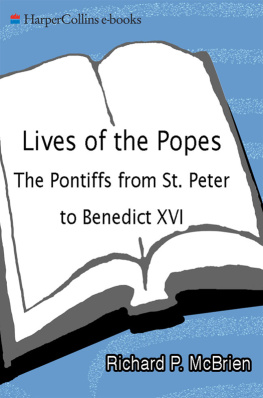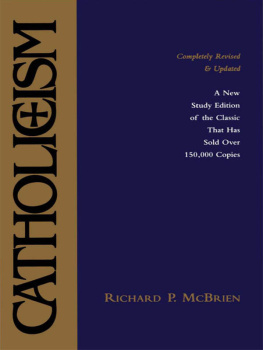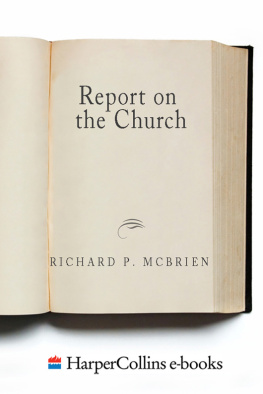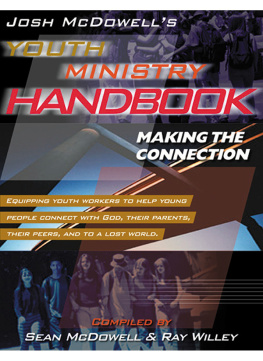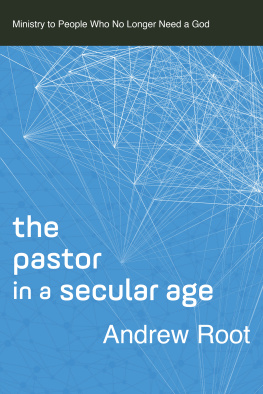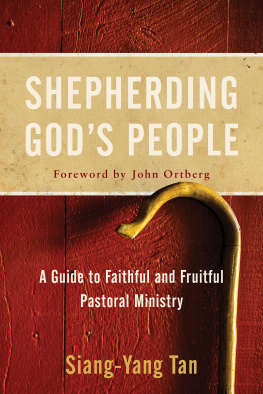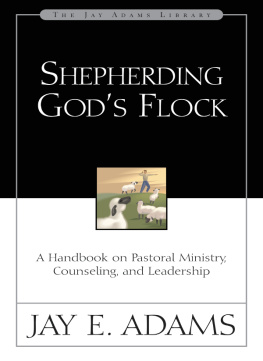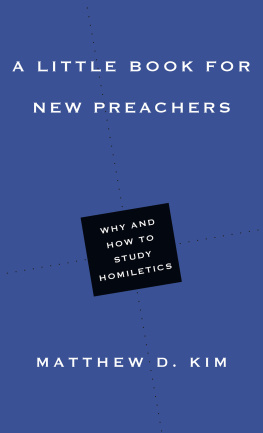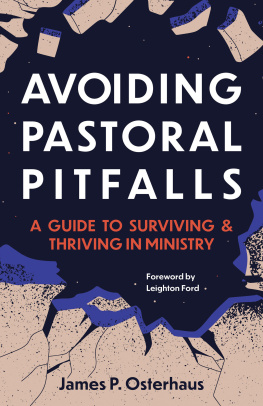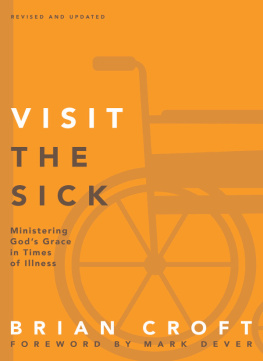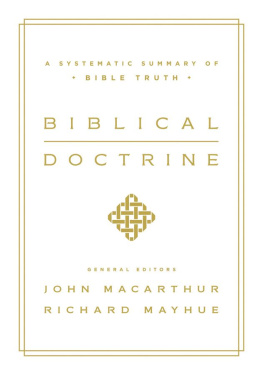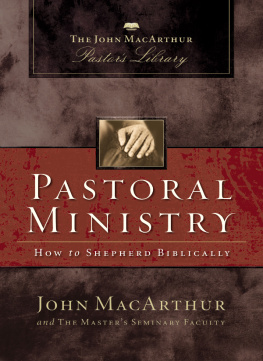Richard P. McBrien - Ministry: A Theological, Pastoral Handbook
Here you can read online Richard P. McBrien - Ministry: A Theological, Pastoral Handbook full text of the book (entire story) in english for free. Download pdf and epub, get meaning, cover and reviews about this ebook. year: 2014, publisher: HarperCollins, genre: Religion. Description of the work, (preface) as well as reviews are available. Best literature library LitArk.com created for fans of good reading and offers a wide selection of genres:
Romance novel
Science fiction
Adventure
Detective
Science
History
Home and family
Prose
Art
Politics
Computer
Non-fiction
Religion
Business
Children
Humor
Choose a favorite category and find really read worthwhile books. Enjoy immersion in the world of imagination, feel the emotions of the characters or learn something new for yourself, make an fascinating discovery.
- Book:Ministry: A Theological, Pastoral Handbook
- Author:
- Publisher:HarperCollins
- Genre:
- Year:2014
- Rating:3 / 5
- Favourites:Add to favourites
- Your mark:
- 60
- 1
- 2
- 3
- 4
- 5
Ministry: A Theological, Pastoral Handbook: summary, description and annotation
We offer to read an annotation, description, summary or preface (depends on what the author of the book "Ministry: A Theological, Pastoral Handbook" wrote himself). If you haven't found the necessary information about the book — write in the comments, we will try to find it.
This highly praised handbook on ministry is an essential resource for clergy and laity alikeclear, readable, theologically sound, and pastorally wise. Traces the development of ministry from New Testament times through Vatican II to provide pastoral guidance for priests, nuns, teachers, and others who are called to the ministry.
Ministry: A Theological, Pastoral Handbook — read online for free the complete book (whole text) full work
Below is the text of the book, divided by pages. System saving the place of the last page read, allows you to conveniently read the book "Ministry: A Theological, Pastoral Handbook" online for free, without having to search again every time where you left off. Put a bookmark, and you can go to the page where you finished reading at any time.
Font size:
Interval:
Bookmark:
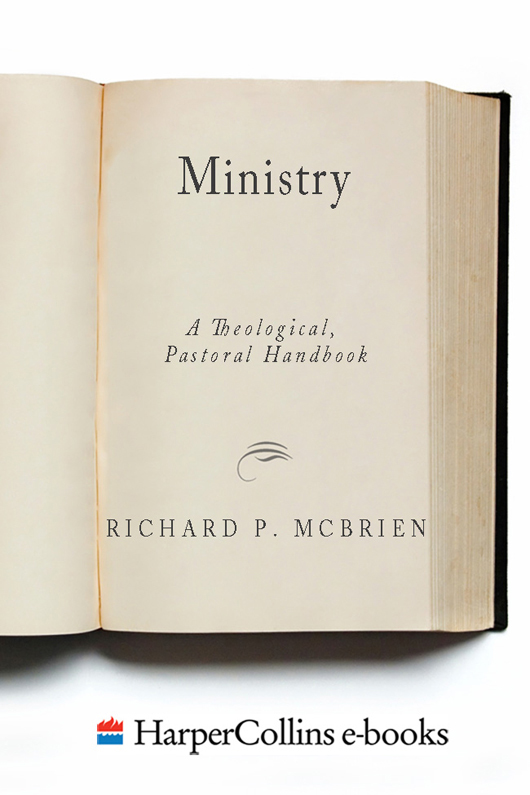
To all who minister for the Church
T his is a book about ministry, but it is neither the first nor the last to be written on the subject. What makes this one different? Most books on ministry fall into one of two categories: either they present a theology of ministry, like the fine book by my colleague at Notre Dame, Thomas F. OMeara, O.P., Theology of Ministry (New York: Paulist Press, 1983), or they offer guidance for the exercise of particular ministries, like Father William Belfords booklet, Special Ministers of the Eucharist (New York: Pueblo, 1979). There are many other good books in both categories. I single out these two only by way of example.
But not many books on ministry attempt to combine the theological with the pastorally practical. Those who are skilled in theology are often uncertain about pastoral matters, and those who are accomplished ministers at the parish or diocesan levels are usually hesitant to engage very much in theological reflection, at least in print.
Ive tried to do both in this bookto offer a theology of ministry that is pastorally practical and to offer pastorally practical guidelines rooted in the best contemporary theology. For that reason I have subtitled the book A theological, pastoral handbook.
Who is the book for? For every minister of the Church, at every level: bishops, pastors, presbyters (ordained priests), deacons, pastoral associates, religious educators, church-school teachers and staff, youth ministers, hospital chaplains, eucharistic ministers, lectors, music ministers, ministers of hospitality, ministers to the elderly, ministers to the sick and the handicapped, college chaplains, social ministers, parish councilors, finance directors, family counselors, ministers to the separated and divorced, directors of communications, directors of ecumenical activities, directors of clergy education, seminary faculty and staff, directors of deacon programs, vocations directors, prison chaplains, diocesan newspaper editors and staff, and as many others as there are ministries in todays Church.
The book is intended, as well, for those now preparing for one of these ministries or who are simply contemplating the possibility. It is also a book for those responsible for identifying and recruiting good candidates for ministry, for educating, training, and spiritually forming future ministers, and for evaluating the pastoral performance of men and women already in ministry.
With that large and diverse readership in mind, I have deliberately written a short book. It will be left to those in various particular ministries to build upon the modest theological-pastoral foundation offered herein.
The first two chapters lay the theological and historical groundwork; the third and fourth make the pastoral and spiritual applications. In chapter 1, What Is Ministry?, I offer basic definitions of ministry, of Church, and of the Kingdom of God, for which the Church exists and toward which all ministry is directed. Chapter 2, How Has Ministry Evolved?, traces the history and changing views of ministry, from the New Testament to the present. It touches upon such issues as the relationships between clergy and laity, between bishops and presbyters, and between the power of orders and the power of jurisdiction. It also discusses the significance of ordination.
Chapter 3, What Qualities Do Ministers Need?, offers seven basic criteria by which the Church can make responsible judgments about the qualifications and pastoral performance of its ministers. Those already in ministry can use these criteria as the basis for ongoing self-evaluation, and those who are preparing for ministry can use them as goals to achieve and standards to meet. Chapter 4, What Is Ministerial Spirituality?, lays the foundation for a ministerial spirituality. It proposes ten criteria by which the active minister and ministerial candidat can discern among competing spiritualities. Since the whole book has to do with the ministers obligation toward the Church, there is a postscript on the Churchs obligation toward its ministers. The relationship between the minister and the Church is reciprocal. Justice requires that the minister give his or her best effort in the service of the community of faith, but justice also requires that the community provide the minister with just and suitable conditions of service. The Church must practice what it preaches if it is to be a credible sign of Christs presence to the world.
I have reproduced in an appendix the important pastoral reflections of the United States Catholic bishops, Called and Gifted: The American Catholic Laity, commemorating the fifteenth anniversary of the Second Vatican Councils Decree on the Apostolate of the Laity. Many of the themes and principles articulated in that pastoral document are reinforced and developed in this book, especially the universal call to Christian maturity, holiness, community, and ministry.
There remains only my own obligation to express thanks where thanks are due: First, to Beverly M. Brazauskas, pastoral associate at Sacred Heart Parish, Notre Dame, Indiana, for reading the entire manuscript and offering many helpful suggestions for improvement. Second, to my colleagues in the department of theology at the University of Notre Dame who share with me the daily challenge of bridging the gap between theology and the needs of our ministerial studentsin particular, Thomas F. OMeara, O.P., Warren Professor of Theology and former director of the Master of Divinity Program; Robert Krieg, C.S.C, associate professor of theology and current M.Div. director, and Regina Coll, C.S.J., director of field education. Third, to those thousands of ministers throughout the United States and Canada who have allowed me over these past several years to test these ideas with them in lectures, workshops, conferences, and coursesespecially my former colleagues and students at Boston Colleges Institute of Religious Education and Pastoral Ministry, which I directed from 1975 to 1980. Fourth, to my secretary, Donna Shearer, and my administrative assistant in the department of theology, Anne Fearing, for assisting in many ways in bringing this project to completion. And finally, to my editor at Harper & Row, Janice M. Johnson, who exhibited a saintly patience while waiting for the manuscript and whose fine editorial hand made this an even better book than it otherwise might have been.
Notre Dame, Indiana
June, 1987
B efore reading this chapter, scribble a definition of ministry on a piece of paper. The exercise will show that its not so easy as it appears on the surface. Ministry encompasses a myriad of functions, but its whole is more than the sum of these functions. (If you write your definition now, youll be able to check after finishing the chapter to see if it took everything important into account.)
Clear-cut definitions of ministry are indeed hard to find. In Bernard Cookes major work, Ministry to Word and Sacraments (Philadelphia, PA: Fortress Press, 1976), which is more than six hundred double-columned pages, there is no definition of ministry. Instead theres a complete and detailed description of some of its functions: formation of community, proclamation of Gods word, service to Gods people, service to Gods judgment, and celebration of the sacraments.
Edward Schillebeeckx, O.P., in his first book on the subject, Ministry: Leadership in the Community of Jesus Christ (New York: Crossroad/Continuum, 1981), also provided no explicit definition as such, although he occasionally came close. Ministry in the church is not a status or state but a service, a function within the community of God and therefore a gift of the Holy Spirit (p. 37). In a sequel,
Font size:
Interval:
Bookmark:
Similar books «Ministry: A Theological, Pastoral Handbook»
Look at similar books to Ministry: A Theological, Pastoral Handbook. We have selected literature similar in name and meaning in the hope of providing readers with more options to find new, interesting, not yet read works.
Discussion, reviews of the book Ministry: A Theological, Pastoral Handbook and just readers' own opinions. Leave your comments, write what you think about the work, its meaning or the main characters. Specify what exactly you liked and what you didn't like, and why you think so.

